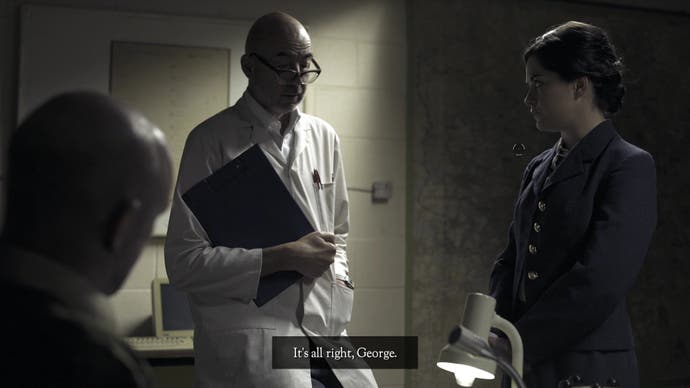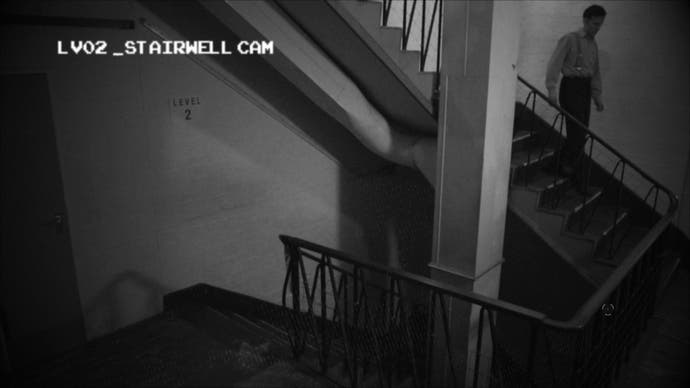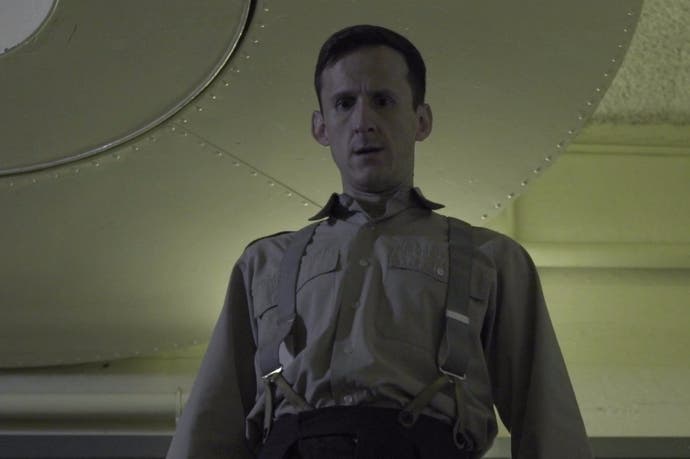The Bunker review
Rad?
If you are of a certain age, you may have had dreams like this: dreams in which the men in the masks come, in which the world is poisoned and you're dragged away to some hole in the ground to escape from the toxic sky. It was always the men in the masks that really stuck with me: a fear of the faceless agents who would usher in the radioactive apocalypse. A fear sharpened, perhaps, by that brilliant moment in ET - itself a film not untouched by the Cold War - in which the mother tries to protect her children while the astronauts advance through her house. Not towards her: around her. A nightmare made worse through its own peculiar focal point.
The Bunker does a lot with ideas like this - with the safety suits, the violations and all the other trappings of the bomb. The bomb has long since fallen here, in fact, and you play as John, a thirty-year-old man who was born in a shelter and has lived his entire life down there. Now, nobody else is left but him, and the first few minutes of this likably earnest game drop you into his sleepwalking daily routine: taking vitamins (captivity has turned John into a thirty-year-old boy who still winces and almost whimpers when he has to swallow a pill), measuring radiation, reading to his mother (definitely not as sweet as it sounds), and counting the remaining tins of horrible bully beef-style dinner he has left.

John, we gather, is sensitive and fearful, cowed by his shut-away life into a state of profound incuriosity about the world. And we gather all this not just through the beats of the script, which steadily starts to develop a mystery for him to get to the bottom of, but through the performance of Adam Brown, a wonderfully lugubrious actor whose sunken eyes and taut mouth will make him a shoo-in for any big budget movie about the life of George Orwell. The Bunker isn't just a throwback to Cold War fantasies, in other words: it's a point-and-click adventure game of sorts, albeit a very streamlined one, that plays out with live action clips seamlessly edited together as you move a mouse around a superimposed UI, hefting keys into locks, say, selecting which desk drawer to investigate, shuffling from one room to another as the small environment comes into focus, or stabbing away at a button to ease open an old hatch.
This reversion to strange old ways of doing things works better than you might expect, up to a point. It has a certain novelty value, for starters, and one that survives the inevitable student-film thinness of the production. It also allows for a couple of good performances and one really memorable one, in the form of Sarah Greene as John's steely mother Margaret. Best of all, it affords this production the means of incorporating a real Cold War bunker which, as Martin mentioned in his preview, is the true star of the show: a place both echoey and claustrophobic, and grimly evocative of old-school Britain in its range of institutional greens and greys.

My admiration has its limits, however. Clocking in at a couple of hours, The Bunker is a fairly simple-minded game - at most you will be tasked with finding the odd key in order to proceed through the linear plot - and while it's often a memorable one, that's more down to its setting and throw-back tech than its design or its narrative, which is predictable and increasingly cloddish in its underlining of the obvious.
I frequently approved of The Bunker's spirit more than I enjoyed the act of playing it. The problems involve both the small things and the larger things, too. Hot spots can sometimes be hard to find as you move around, and beyond that there's a growing sense that the developers are frantically searching for meaningful things for the player to actually do. Games don't have to keep you busy - some of the most interesting encourage you to do little but walk and smell the flowers - but this one does not seem to settle into its sparsity with any real confidence.
Then, towards the end of the adventure, the number of potential fail states increased just enough to allow me to discover that, for some reason, I think I find watching film clips play for the second time when I've messed up a QTE more wearying than I find plodding back through a previously completed section in a more traditionally rendered video game. Perhaps it's because of the inevitable distancing effect of watching a film: that sense of being slightly powerless.
John would appreciate that feeling, of course, so maybe it's thematic resonance. He'd also appreciate the sensation of being ever-so-slightly bored, however, which is more of a surprise given The Bunker's brisk running time. I doubt that one's thematic resonance, to be honest. I think it's more to do with what can happen when you graft film and games together in a well-intentioned, but slightly limiting manner.

